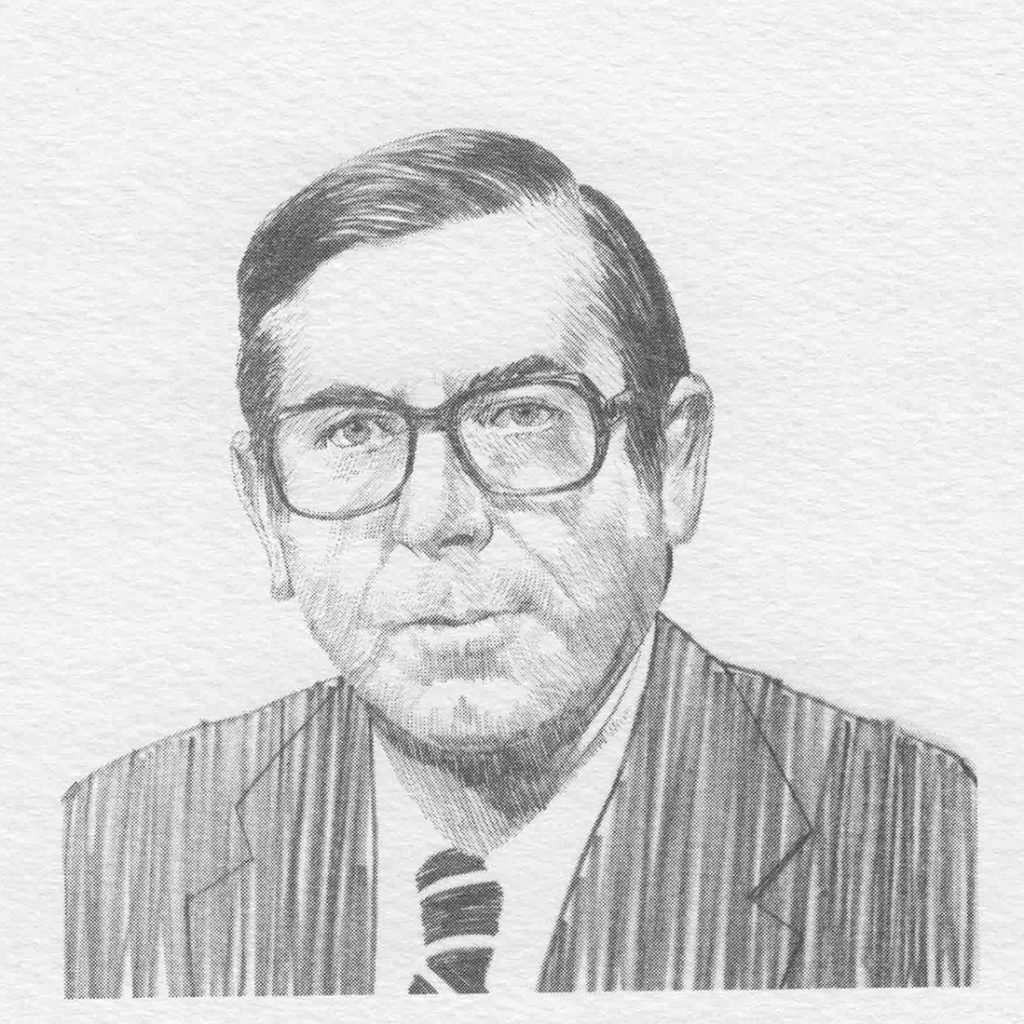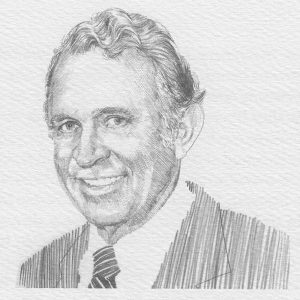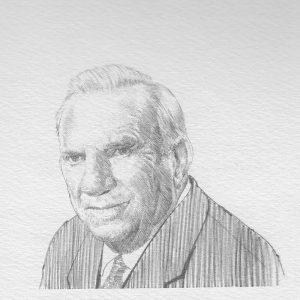Eugene Cleveland Gwaltney, Chairman and Chief Executive Officer of Russell Corporation based in Alexander City, Alabama, has been with the company for 39 years and is still enthusiastic about his work and the textile industry. Just last year (in June 1990 Textile World) he was quoted as saying, “So many new procedures are coming onstream… The next ten years are going to be exciting times.”
In an industry that has been battered by a flood of imports, Russell Corporation under Eugene Gwaltney’s leadership has emerged as a world-class manufacturer of activewear and sports uniforms, ready to compete in the world market. He has been an innovator since he became- President and CEO in 1972. He is still an innovator, as indicated by his being chosen by Fortune (Spring/Summer 1991) as one of twenty-five business people who exemplify those in the United States who are helping America become a stronger competitor. These people generate ideas and put them into action.
Eugene Cleveland Gwaltney was born in Rock Hill, South Carolina, on January 25, 1918. After graduating from high school in Macon, Georgia, he entered Georgia Tech from which he earned a B.S.M.E. in 1940. His graduate study at M.I.T. came to a halt when the United States entered World War II. He served in the Army Corps of Engineers from 1941 to 1945, and he held the rank of major when he was discharged.
Before joining Russell in 1952 as Director of Research and Quality Control, he held positions with Burlington Mills, Arlind Corporation, and Robert & Company. By 1957, he had been named General Superintendent at Russell; by 1960, Vice President and Director; by 1968, President and Chief Operations Officer.
When he became President and CEO in 1972, Russell Corporation was earning about 3% on sales of $75 million. The prevailing industry wisdom at that time was to keep capital spending down, but Eugene Gwaltney disagreed with this philosophy. This “maverick of the textile industry,” as he has since been called, initiated capital spending on the modernization of all facets of the Russell operation.
He believed then, as he does now, that companies should not worry about 90-day progress reports. Companies should plan for the long term and be willing to invest in new technology today in order to ensure profits in the future.
Eugene Gwaltney’s philosophy has proved a valid one. Within three years after he became President and CEO, Russell’s profit from sales had doubled from 3% to 6%. In 1980, Russell was cited by Textile World as the Model Mill for the Eighties. By 198•4, Russell was earning 8% on sales of $353 million, almost double the industry average. By 1990, sales had reached $688 million, and Fortune 500 ranked Russell Corp. fourteenth in total return to shareholders during the previous decade. As the last decade of the 20th century began, Eugene Gwaltney said he hoped that Russell would also be the model mill for the 1990s, and it well might be.
Today Russell Corp. (once primarily a producer of ladies undergarments) is a vertically integrated, international manufacturer and marketer of leisure apparel, activewear, athletic uniforms, better-knit shirts, and a comprehensive line of lightweight yarn-dyed woven fabrics.
The company has become known worldwide for its continued modernization, acquisition, and innovative equipment investments. In every aspect of its vertical operation-from raw fiber to finished fabric to garment-Russell is continually seeking quality. For example, there is now a test and evaluation facility which helps management assess new machinery for plants in operation or on the drawing board. The company has also invested in a ginning operation to experiment in producing quality fibers.
While the corporation continues to modernize and expand its operations in the U.S. and abroad (in 1990, a sweatshirt and T-shirt manufacturing plant in Scotland became UK-Russell), Eugene Gwaltney has never lost sight of the value of Russell employees in the success of the company. He has created a climate in which employees want to learn new ways of doing things because they realize that profits occur only if everyone makes 100% effort. He believes in “hands-on management” and trains each group of new managers to be ready to “roll up their sleeves” to make new projects work.
There are exemplary childcare, education, and employee assistance programs, as well as a system of rewarding workers for a job well done.
Faith in the corporation is reflected by the fact that there are second, third, and fourth generation workers in the Alexander City operations. Also, almost everyone in senior management has been a Russell employee for a minimum of twenty years. Everyone at Russell knows the company is secure and that each person has a part in its success.
Russell Corporation has, of course, played a major role in the development of Alexander City, Alabama, since Benjamin Russell founded Russell Manufacturing Company in 1902. The family name is on the local high school, the stadium, and the hospital.
Eugene Gwaltney has extended the corporation’s involvement in the welfare of the community and its citizens through, for example, emphasis on the importance of education. Today young people seeking employment at Russell must not only have a high school diploma or
G.E.D. but also must exhibit the needed capabilities in math and reading skills required for their intended jobs. Parents working at Russell are encouraged to take part in their children’s education. Employees can take time off with pay for any requested parent-teacher conferences.
Eugene Gwaltney serves Alexander City as chairman of the Russell Hospital Board of Trustees and as vice chairman of the First National Bank of Alexander City.
Through the years, Eugene Gwaltney has also found time to serve as President of the National Knitwear Manufacturing Association and the Alabama Textile Manufacturing Association. He has been a director of the American Textile Manufacturing Institute, of the Alabama Chamber of Commerce, and of the Federal Reserve Bank in Birmingham.
He has lent his expertise and his support to higher education in Alabama through service as a member of the Board of Visitors of the College of Commerce and the Manderson Graduate School of Business at The University of Alabama; as a trustee at Birmingham-Southern College and Tuskegee Institute; and as a member of the Georgia Tech National Advisory Board.
He is currently a trustee emeritus of the Georgia Tech Foundation, as well as a member of the Alabama Management Improvement Institute and the Alabama Study Commission.
For his leadership and contributions, Eugene Gwaltney has received numerous awards. In 1976 he was the recipient of the MIT Corporate Leadership Award. In 1978, he was named Alexander City “Man of the Year,” and, in 1982, the New York Board of Trade ”Textile Man of the Year.” In 1987, he was an honoree of the American Apparel Education Foundation. In 1988, he received an honorary Doctor of Laws degree from The University of Alabama in Birmingham.
Eugene C. Gwaltney, who is married to the former Nancy Russell, is probably the last of the family who will manage Russell Corporation. But this corporation, still 40% family-owned, will surely continue to be competitive in the world market because of Eugene Gwaltney’s philosophy of calculated investment in the best machinery, the best people, and the best marketing tools.
“We decided to be the best,” Eugene Gwaltney once said. And the best is what the corporation is and probably will be.



